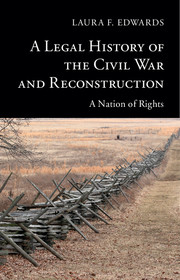Book contents
- Frontmatter
- Dedication
- Contents
- Acknowledgments
- Introduction
- 1 The United States and Its Use of the People
- 2 The Confederacy and Its Legal Contradictions
- 3 Enslaved Americans, Emancipation, and the Future Legal Order
- 4 The Federal Government and the Reconstruction of the Legal Order
- 5 The Possibilities of Rights
- 6 The Power of Law and the Limits of Rights
- Conclusion
- Bibliographic Essay
- Bibliography
- Index
- References
3 - Enslaved Americans, Emancipation, and the Future Legal Order
Published online by Cambridge University Press: 05 February 2015
- Frontmatter
- Dedication
- Contents
- Acknowledgments
- Introduction
- 1 The United States and Its Use of the People
- 2 The Confederacy and Its Legal Contradictions
- 3 Enslaved Americans, Emancipation, and the Future Legal Order
- 4 The Federal Government and the Reconstruction of the Legal Order
- 5 The Possibilities of Rights
- 6 The Power of Law and the Limits of Rights
- Conclusion
- Bibliographic Essay
- Bibliography
- Index
- References
Summary
Although slavery figured prominently in the rhetoric of political leaders on the eve of the Civil War, enslaved African Americans did not. When Abraham Lincoln was elected in 1860, he promised not to touch slavery in those states where it already existed. He did oppose the extension of slavery into western territories, in keeping with the Republican Party platform. But, otherwise, he vowed to keep the federal government out of the institution, leaving its regulation and the status of enslaved African Americans to the states. “I have no purpose, directly or indirectly, to interfere with the institution of slavery in the States where it exists,” promised Lincoln in his inaugural address. “I believe I have no lawful right to do so, and I have no inclination to do so.” Those words provided no consolation to Confederate leaders, who thought Lincoln’s election would lead inevitably to slavery’s demise. Even so, they gave surprisingly little consideration to the implications of war for those they held in bondage.
Enslaved African Americans felt differently. They began leaving slavery in the summer of 1861, even before secession devolved into war. More accurately, they left slavery for freedom, which moved geographically closer in 1861 than it had ever been before, particularly for those along the coast of the eastern seaboard. Where they once had to travel hundreds of miles to free states in the North, they were now within hailing distance of those states’ representatives: the U.S. Navy, which patrolled the Confederate coast in its blockade, and the U.S. Army, which occupied federal forts offshore in Virginia, Georgia, North Carolina, and South Carolina. Enslaved African Americans along the South Carolina coast began fleeing to U.S. naval vessels as soon as the state seceded. By July 1861, about nine hundred of slavery’s refugees had sought asylum with General Benjamin Butler’s army at Fortress Monroe, Virginia.
- Type
- Chapter
- Information
- A Legal History of the Civil War and ReconstructionA Nation of Rights, pp. 64 - 89Publisher: Cambridge University PressPrint publication year: 2015

